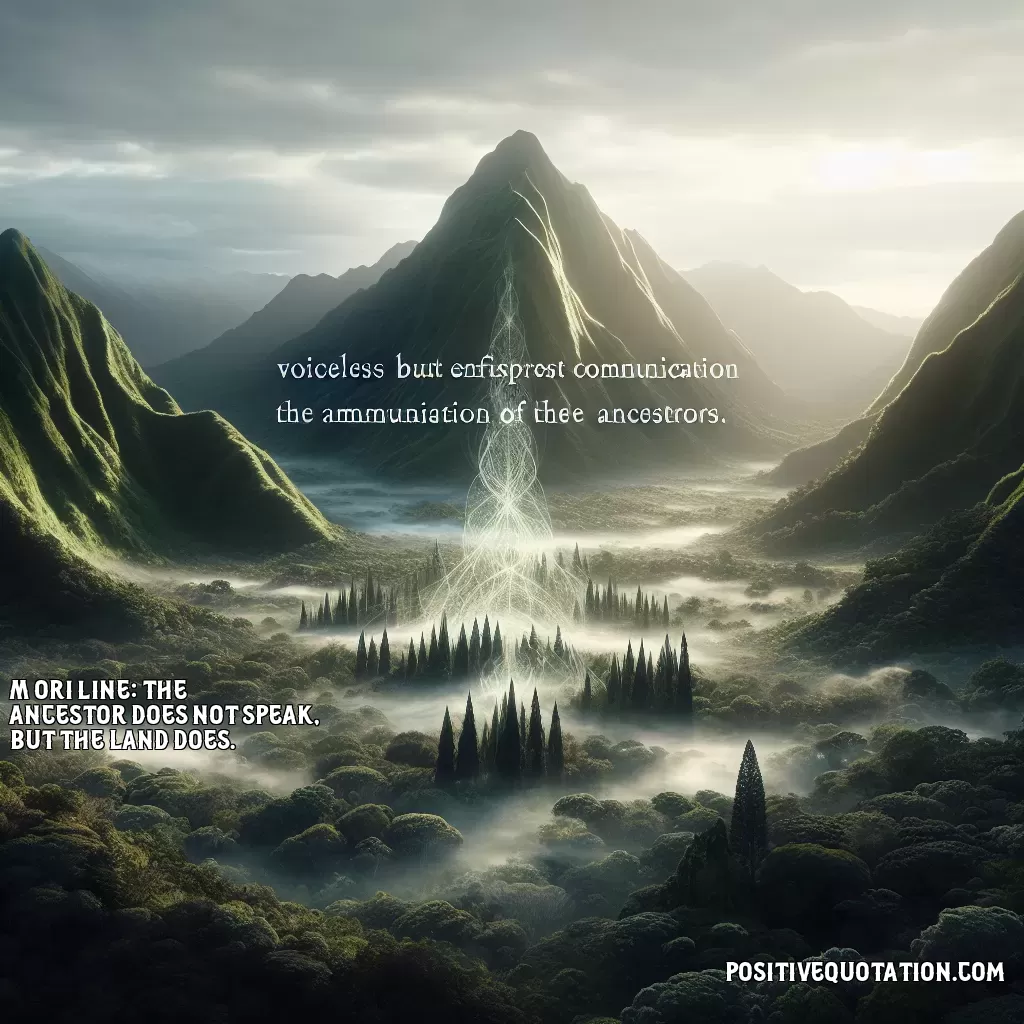
Maori Line: The ancestor does not speak, but the land does.
Author: Margaret Mutu
👁️ 19 views
The quote "The ancestor does not speak, but the land does" can be understood as a profound reflection on the relationship between people, their ancestors, and the land they inhabit. In many indigenous cultures, including the M?ori, the land is seen not just as a physical space but as a living entity that holds the stories, histories, and spirits of those who came before. While the ancestors themselves may no longer speak in a literal sense, their presence and influence are deeply felt through the land. For the M?ori, the land is a sacred part of their identity and cultural heritage. It is considered a source of wisdom and connection to the spiritual world. The land carries the memories and deeds of the ancestors; it is a witness to their struggles, achievements, and ways of life. Thus, when the quote says that "the ancestor does not speak, but the land does," it suggests that the land communicates these ancestral stories and teachings to those who are willing to listen and engage with it. In this context, listening to the land can mean being attentive to the natural world and understanding the ecological and spiritual lessons it imparts. It advocates for a respect for nature and the acknowledgment that the land is a repository of ancestral knowledge. Such a perspective invites individuals to consider their place within the larger tapestry of life, recognizing that they are part of an ongoing story that is interwoven with the lives of their ancestors and the land they occupy. This worldview underscores the belief in the interconnectedness of all things, emphasizing that the lessons from the past are still relevant and accessible, helping to guide present and future generations. The quote calls for a harmonious relationship with nature, where the land itself becomes a voice for the ancestors, offering guidance and insight to those who are attuned to its messages.
Quote By: Margaret Mutu
**Margaret Mutu: A Trailblazer in Indigenous Rights and Environmental Advocacy**
Margaret Mutu is a prominent Māori leader, academic, and advocate for Indigenous rights and environmental justice. Born in Aotearoa New Zealand, Mutu’s lineage ties her to the Ngāti Kahu iwi (tribe), and she has dedicated her life to preserving Māori culture and promoting Indigenous sovereignty. Her work spans across various fields including anthropology, sociology, and environmental studies, making her a multifaceted contributor to both scholarly research and community activism.
With a Ph.D. from the University of Auckland, Margaret Mutu is a professor at the same institution, where she has been a vital force in shaping the discourse around Māori studies. She is known for her insightful critiques of colonialism and the ongoing impacts it has on Indigenous populations. Throughout her career, Mutu has authored numerous publications, including articles and books that highlight the intersection of Indigenous rights, environmental sustainability, and social justice. Her influential writings often address the significance of land and the environment in Indigenous cultures, emphasizing the deep connections between Māori identity and their ancestral lands.
Margaret Mutu has also played an essential role in advocating for the rights of Māori people within the New Zealand political landscape. She has been involved in various initiatives aimed at protecting Māori interests in environmental governance and resource management. Her efforts extend beyond academia into grassroots activism, where she has worked tirelessly to uplift Māori voices in conversations about climate change and environmental degradation.
As a speaker and leader, Margaret Mutu inspires others by emphasizing the importance of acknowledging Indigenous knowledge systems in addressing contemporary challenges. Her contributions have positioned her as a key figure in the global movement for Indigenous rights, and she continues to influence policymakers and scholars alike through her unwavering commitment to justice for Indigenous peoples.
In summary, Margaret Mutu’s profound impact on both academia and activism illustrates her dedication to Māori rights and environmental advocacy. Through her research, leadership, and unwavering passion, she stands as a beacon for those seeking to respect and uplift Indigenous voices around the world. Margaret Mutu remains a driving force in the movement for social and environmental justice, ensuring that Māori perspectives will play a critical role in shaping the future of Aotearoa and beyond.